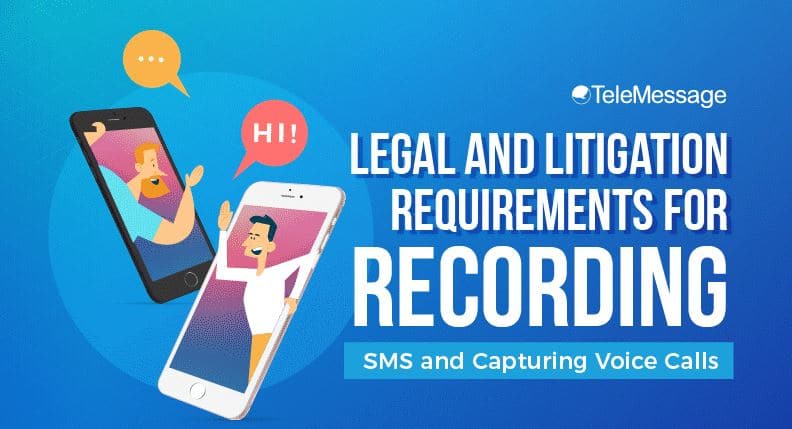There are several motivations for why companies should record SMS, and capture voice calls and other mobile content, primarily for staying compliant with data retention regulations relevant to them. But beyond addressing compliance, many companies do not realize the other, equally important reasons they should retain their employees’ communication.
Aside from satisfying regulatory obligations, businesses and organizations must also take into consideration the regulatory and litigation implications for archiving business communications such as text messages and phone calls.
The legal and litigation requirement to retain and manage electronic data is imposed on the amended Federal Rules of Civil Procedures, which states that all emails, communications, files, directives, and requests that may be relevant to litigation must be put on legal hold. This is especially important for organizations that reasonably expect upcoming litigation, and might be required to produce such data during the investigation process.
FRCP Electronic Archiving Standards
The Federal Rules of Civil Procedure are rules that govern the procedures for civil legal suits within the United States federal courts. Their purpose is “to secure the just, speedy, and inexpensive determination of every action and proceeding.”
In 2006, the U.S. Supreme Court’s amendments to the FRPC created a category for electronic records that, for the first time, explicitly named emails and instant message chats as likely records to be archived and produced when relevant.

However, after the rules were amended, many lawyers expressed their concerns about inconsistent case law regarding the standards for spoliation in document production during the discovery process. This is after some courts only required finding negligence while others required bad faith, which then resulted for many organizations to adopt the “archive everything” strategy.
In 2015, the FRCP were amended again, and now have an eDiscovery rule grounded on three principles:
- Limiting the scope and cost of a large discovery request
- Cooperation between parties to fast track resolution to disputes
- Flexibility around penalties when reasonable steps have been taken, and important records can still be produced.
Currently, 35 states have adopted procedural codes based on FRCP, though some have implemented slight variations.
Amended Rule 26
Under the amended Rule 26, all electronic communications, especially emails and instant messages must be retained alongside other data that are soon to be or are currently relevant to any party’s claim or defense and proportional to the needs of the case.
To comply with this new rule, it’s important for companies to know where their potentially relevant data is stored and how long it would take to collect it. Having a holistic view of the location of this data will not only save time and stress when it comes to collection, but will also provide insight as to how to reduce the burden and cost of eDiscovery.
It is also important for both the requesting and responding parties to meet and confer to establish a clear understanding of the case, and therefore of the requested data. In doing so, both sides can create eDiscovery standards that can ultimately lead to a more efficient collecting efforts.
Implications of Failing to Preserve Relevant Electronic Records
Failure to preserve ESIs can result in the government agency suffering significant sanctions from the ruling court. Under amended Rule 37(e), the court may impose sanctions on an offending party for failing to preserve ESI where the ESI (1) “should have been preserved in the anticipation or conduct of litigation”; (2) is lost “because a party failed to take reasonable steps to preserve it”; and (3) “cannot be restored or replaced through additional discovery.”
An example of a case law that shows the gravity of this rule is shown in Arrowhead Capital Finance, Ltd. v. Seven Arts Entertainment, Inc. In this case, the defendant’s bad faith that caused the spoliation of relevant electronically stored information (ESI) led the court to impose sanctions on the defendant, as well as the CEO and lawyers due to their blatantly irresponsible behavior.
Conclusion
Complying with litigation requests for records of electronic communications relevant to a case can be very complex, especially if there is no robust modern archiving solution in place that not only captures and records mobile conversations of the employees but can also immediately produce the records of archived communications.
TeleMessage’s Mobile Archiver is a proven choice for organizations and companies aiming to ensure on-time compliance during litigation request. From real-time capture of mobile texts, voice calls, Instant Messages (IMs), emails, and other mobile content, to secure delivery to an archiving system and on-demand search and retrieval, TeleMessage is a powerful tool that can handle eDiscovery requests of any size with ease.
TeleMessage also integrates leading email archiving vendors, enabling companies to capture, retain, and supervise mobile text messages in the same way they archive and supervise their employees’ emails and documents.
Our mobile archiving products securely capture content from mobile carriers and mobile devices for a variety of ownership models (BYOD, CYOD, and employer-issued). With our multiple archiving methods, you can always find the right tools or blend for your requirements:
Visit our website at www.telemessage.com today to learn more about how our mobile archiving products can help your organization maintain compliance legal and litigation text archiving and call recording regulations.

